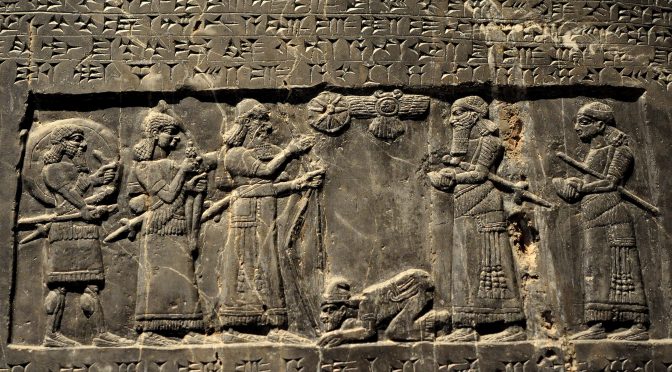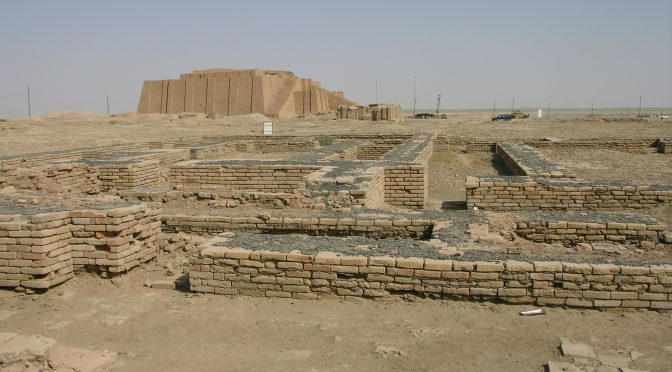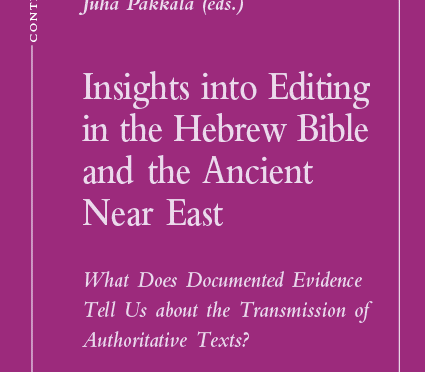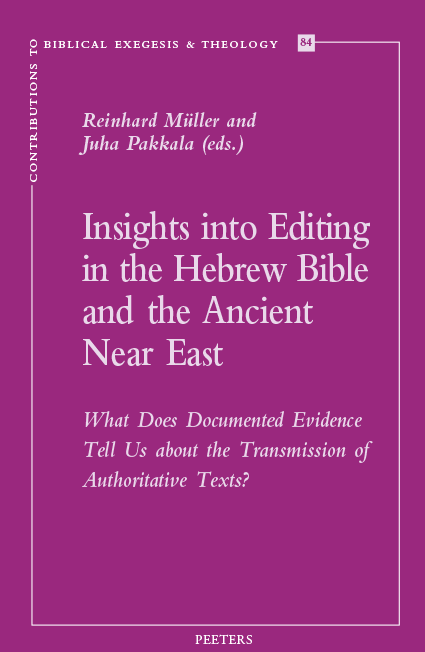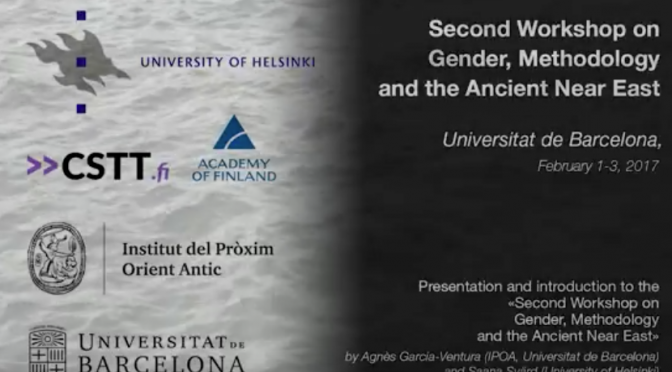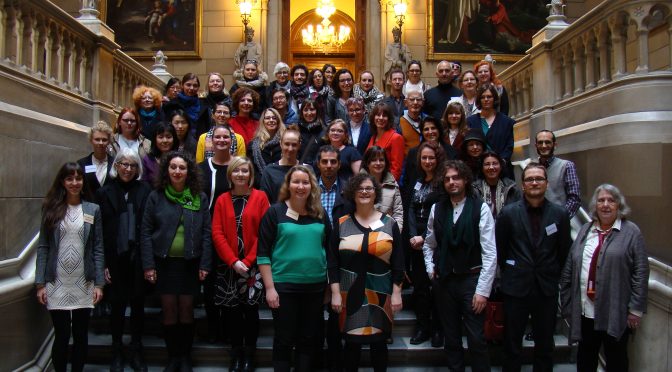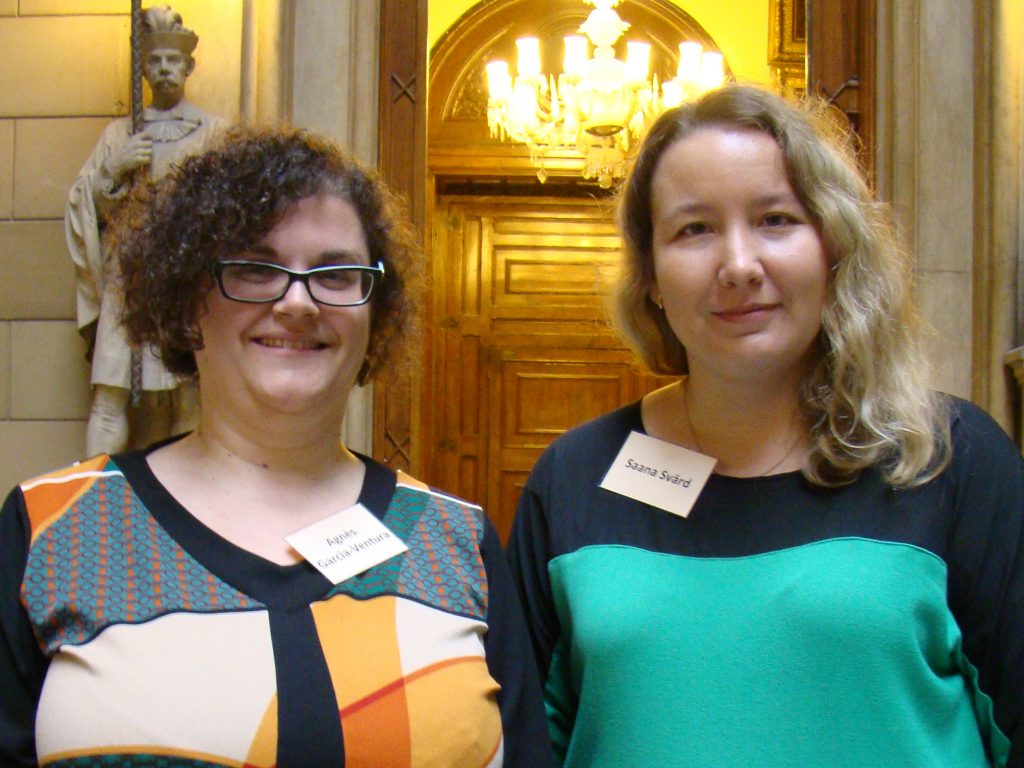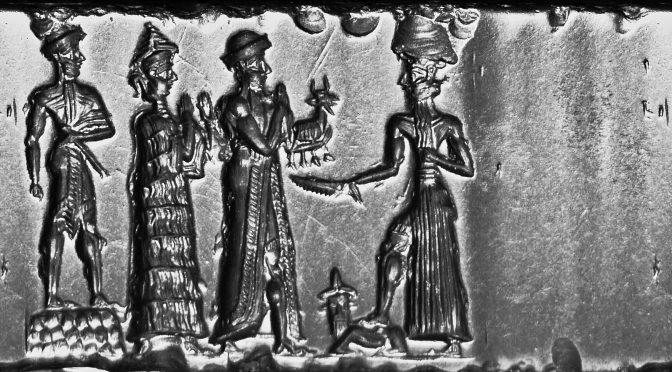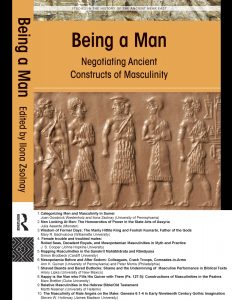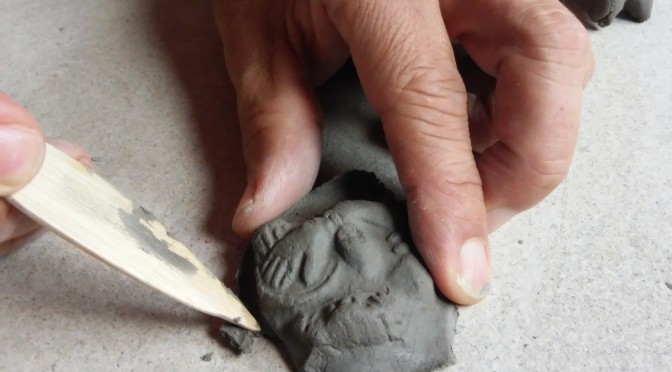We have the pleasure to invite participants to the “Second Workshop on Gender, Methodology, and the Ancient Near East.” The workshop will be held in Barcelona, February 1-3, 2017 and hosted by the IPOA (University of Barcelona) and organized in cooperation with The Centre of Excellence in ‘Changes in Sacred Texts and Traditions’ (University of Helsinki). The aim of the meeting is to discuss different methodological and theoretical approaches to gender within the framework of ancient Near Eastern studies (including archaeology, art history and text studies) and to enable fruitful dialogues between these approaches and between different fields.
The provisional program of the meeting can be seen below. It is free for participation, but registration is needed. If you are planning to join us, please send an email to one or both of us: Dr. Saana Svärd and Dr. Agnès Garcia-Ventura
***************************************************
Second Workshop on Gender, Methodology and the Ancient Near East
Universitat de Barcelona, February 1-3, 2017
Hosts: IPOA, Universitat de Barcelona / Centre of Excellence “Sacred Texts in Change” in the University of Helsinki
Organizers: Agnès Garcia-Ventura (“Sapienza”, Università degli Studi di Roma / IPOA, Universitat de Barcelona) / Saana Svärd (University of Helsinki)
Wednesday February 1st 2017
9.00-9.45: welcome and introduction
9.00-9.15: Welcome: Adelina Millet Albà, director of the IPOA
9.15-9.45: Presentation and introduction to the workshop: Agnès Garcia-Ventura & Saana Svärd, “Studying Gender in the Ancient Near East: An Introduction”
9.45-11.15: panel 1 (Chair: Adelina Millet Albà)
9.45-10.15: Ann Guinan, “Dressing the Whore of Babylon for the 21st Century: Sex, Gender and Theory in Mesopotamian Studies”
10.15-10.45: Gioele Zisa, “Queering šà-zi.ga Therapy. Considerations on the Relations between Masculinity, Sickness and Anatomy”
10.45-11.15: M. Erica Couto-Ferreira: “Domesticating the Female Body: Ancient Mesopotamian Discourses on Fertility and (Re)production”
11.15-11.45: coffee break
11.45-13.45: panel 2 (Chair: Katrien De Graef)
11.45-12.15: Helga Vogel: “Is ‘Harem’ a Useful Category for Describing and Analysing the Living Conditions of ancient Near Eastern Women?”
12.15-12.45: Leire Olabarria: “Kinship and Gender in Dialogue: Approaching Relatedness in ancient Egypt”
12.45-13.15: Jacquelyn Williamson: “Nefertiti and the ‘Docile Agent’”
13.15-13.45: Thais Rocha da Silva: “Gender Studies and Daily Life in ancient Egypt: Theoretical Problems and new Perspectives”
13.45-15.00: lunch break (catered lunch for speakers and poster presenters)
15.00-16.30: panel 3: poster session (Chair: Agnès Garcia-Ventura)
15.00-15.30: presentation of posters (plenary, room 0.1)
15.30-16.30: discussion of posters (individually, with each presenter, room 0.3; the poster room will be also open during breaks on Thursday and Friday).
Confirmed poster presenters (by alphabetical order): Mina Dabbagh, Sara González, HESTIA research group (Ana Delgado, Meritxell Ferrer and Mireia López-Bertran), Elena Martínez Rodríguez, Michèle Meijer, Omar N’Shea, TÀCITA MUTA research group (Cristina Yúfera, Georgina Rabassó and David Muñoz).
16.30-17.00: fruit break (room 0.3)
17.00-19.00: panel 4 (Chair: Jacquelyn Williamson)
17.00-17.30: Katrien De Graef: “A Room of Her Own? On the Origin, Meaning, and Functioning of the Gagûm in Old Babylonian Sippar”
17.30-18.00: Josué J. Justel: “Remarkable Women from Tikunani: The Role of Women in Palatial Administration”
18.00-18.30: Anne-Isabelle Langlois: “The Princess Iltani’s Archives uncovered at Tell al-Rimah (18th century BC)”
18.30-19.00: Laura Cousin / Yoko Watai: “Onomastics of Women in the Neo-Babylonian Period: An Approach from Gender Studies”
Thursday February 2nd 2017
9.30-11.30: panel 5 (Chair: Ann Guinan)
9.30-10.00: Sophus Helle: “The Dynamics of a Three-sex Model”
10.00-10.30: Ilan Peled: “Identifying Gender Ambiguity in Texts and Artifacts”
10.30-11.00: Megan Cifarelli: “Problematizing Masculinity and Militarization at Hasanlu, Iran”
11.00-11.30: Laura B. Mazow: “Of War and Weaving: ‘Swords’ and the Complexities of Archaeological Reconstructions of Gender”
11.30-12.00: coffee break
12.00-14.00: panel 6 (Chair: Josué J. Justel)
12.00-12.30: Jana Matuszak: “Assessing Misogyny in Sumerian Advice Literature, Dialogues, and Diatribes”
12.30-13.00: Frauke Weiershäuser: “Narrating about women, narrating about men”
13.00-13.30: Vanessa Juloux: “Philosophy of action and pragmatic approach: a concrete example with ʿAnatu of Ugarit”
13.30-13.45: group photo
13.45-15.30: lunch break
15.30-17.00: panel 7 (Chair: Frances Pinnock)
15.30-16.00: Stephanie Lynn Budin, “Potent Images: The Nude Female Icon as Locus of Power”
16.00-16.30: Elisa Roßberger: “The gendered body as symbolic artefact. Changes in terracotta production in early second millennium Mesopotamia”
16.30-17.00: Erin Darby: “Sex Symbols: Ritual Production and Performativity in Female Near Eastern Terracottas”
17.00-17.30: fruit break (room 0.3)
17.30-19.00: panel 8 – projects panel (Chair: Saana Svärd)
In this panel some current ongoing (or just launched projects) will be presented. In addition, participants will be encouraged to discuss networking possibilities and development of future projects to promote the study of gender in the ancient Near East. The following projects (provisional list) will be presented:
Beth Alpert Nakhai: “Field Safety: Middle East, North Africa, and the Mediterranean Basin”
Katrien De Graef: “GAND = Gender and Assyriology: New Developments”
Anne Katrine de Hemmer Gudme: “Food and Identity in Biblical Literature”
Amy Gansell: “Introducing a Queen to the Virtual Reality Simulation of Nimrud’s Northwest Palace”
Josué J. Justel & Agnès Garcia-Ventura: “Editing a handbook on women in the ancient Near East in Spanish”
Ilan Peled: “LaOCOST – Law and Order: Cuneiform Online Sustainable Tool”
Stephanie Budin“Women in Antiquity. Real Women across the Ancient World”
20.00 Conference dinner (for speakers and poster presenters, by invitation)
Friday February 3rd 2017
9.30-11.30: panel 9 (Chair: Beth Alpert Nakhai)
9.30-10.00: Anne Katrine de Hemmer Gudme: “Death at the Hand of a Woman: Hospitality and Gender in the Hebrew Bible”
10.00-10.30: Sandra Jacobs: “’The Disposable Wife’ and Her Status in the Hebrew Bible”
10.30-11.00: Federico Dal Bo: “Women are like cattle”. Some Remarks on early Jewish Juridical Vocabulary on Women and Nature
11.00-11.30: Adelina Millet Albà: “Real characters or literary characters? The Matriarchs in the Bible”
11.30-12.00: coffee break
12.00-14.00: panel 10 (Chair: Saana Svärd)
12.00-12.30: Natalie N. May: “Female Scholarship in Mesopotamia?”
12.30-13.00: Sanae Ito: “Female and Male Scribes related to the Queen’s Household in the Assyrian Empire”
13.00-13.30: Frances Pinnock: “Amorite ladies at the Neo-Assyrian Court: building up an image, deconstructing an image, transmitting an image”
13.30-14.00: Amy Gansell: “Introducing a Queen to the Virtual Reality Simulation of Nimrud’s Northwest Palace”
14.00-15.30: lunch break
15.30-16.30: panel 11 (Chair: Stephanie Lynn Budin)
15.30-16.00: Anne-Caroline Rendu Loisel: “Gender, Sense and Sensitivity in Ancient Mesopotamian Rituals”
16.00-16.30: Mónica Palmero Fernández: “Inanna/Ishtar: religion, gender and power in the 3rd millennium B.C., or how to weave interdisciplinarity into the socio-political and socioeconomic analysis of belief”
16.30-17.00: fruit break (room 0.3)
17.00-18.30: panel 12 (Chair: Megan Cifarelli)
17.00-17.30: Beth Alpert Nakhai: “The Women of Jerusalem: Capital City Life in Israel’s Iron Age”
17.30-18.00: Helen Dixon: “Locating Phoenician Women: Space, Gender, and Social Roles in the Iron Age Central Levant”
18.00-18.30: Mireia López-Bertran: “Shrines for women?: Phoenician-Punic sanctuaries as feminine arenas”
18.30-19.00: concluding remarks and farewell

